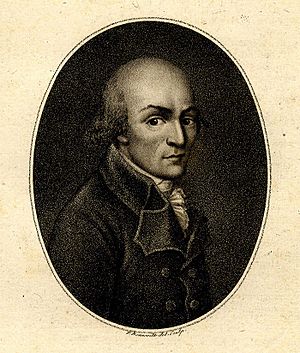Jean-Baptiste Louvet de Couvray facts for kids
Quick facts for kids
Jean-Baptiste Louvet de Couvray
|
|
|---|---|
 |
|
| Born | 12 June 1760 Paris |
| Died | 25 August 1797 (aged 37) Paris |
| Occupation | Novelist, playwright, journalist |
| Nationality | French |
| Signature | |
 |
|
Jean-Baptiste Louvet de Couvray (born June 12, 1760 – died August 25, 1797) was a French writer, known for his novels, plays, and journalism. He lived during the exciting and often dangerous time of the French Revolution.
Contents
About Jean-Baptiste Louvet de Couvray
Early Life and Writing
Jean-Baptiste Louvet de Couvray was born in Paris. His father was a stationer, someone who sold paper and writing supplies. Louvet started his career working as a clerk in a bookstore.
He first became well-known for his novel series, Les Amours du chevalier de Faublas, which began in 1787. The main character, Lodoiska, was inspired by a real person. She later divorced her husband and married Louvet in 1793. His second novel, Émilie de Varmont (1791), discussed ideas about marriage and social changes happening during the French Revolution. All his writings supported the new revolutionary ideas.
Louvet also tried to have his plays performed. One play, L'Anoblié conspirateur, was about the royalist armies who had left France. It was quite popular and played for twenty-five nights.
Early Political Actions
Louvet first gained attention in politics with his writing Paris justifié. This piece defended Paris against criticisms from Jean Joseph Mounier, who had attacked the capital after King Louis XVI moved from Versailles to Paris in 1789.
His writing led to him joining the Jacobin Club, a famous political group during the Revolution. Louvet was a strong supporter of revolutionary ideas. He spoke out against leaders who wanted to keep a king, like the Marquis de la Fayette.
Becoming a Deputy and Girondist
In December 1791, Louvet presented a petition to the Legislative Assembly against the princes who had left France. This had a big impact. He was elected as a deputy for the Loiret region and gave his first speech in January 1792.
He joined the Girondists, a political group who believed in a republic and human rights. From March to November 1792, he published a newspaper called La Sentinelle. Its goal was to spread the ideas of the Enlightenment across Europe. This was a time when France was at war with the Habsburgs, and there was a clear split between the king and the people.
After the king's power effectively ended on August 10, 1792, Louvet became an editor for the Journal des Débats. As a journalist and a deputy in the National Convention, he openly criticized Maximilien de Robespierre and Jean-Paul Marat, who were powerful leaders of another group called the Montagnards. He accused them of trying to gain too much power. He even called Robespierre a "Royalist," meaning he thought Robespierre secretly supported the king.
Louvet was brave during the king's trial. He supported letting the people decide the king's fate, rather than giving him the death penalty right away. This made his party even more unpopular. After May 31, 1793, when the sans-culottes stormed the Convention, Louvet and other Girondists had to flee Paris for their safety. His wife, Lodoiska, who helped him in his work, was also in danger.
After Robespierre and the Directory
After Robespierre's fall from power in July 1794, Louvet was called back to the Convention. He played a key role in bringing to justice those responsible for terrible events, like the drownings in Nantes. He became very influential, joining the Committee of the Constitution and the Committee of Public Safety. He even became president of the Assembly.
Even though he had fought against the Montagnards, he remained a strong supporter of republican ideas. His newspaper, La Sentinelle, started up again, encouraging unity among republicans. Under the Directory government (1795), he was elected to the Council of Five Hundred and also became a member of the Institut de France.
Louvet also went back to his bookselling business in the Palais Royal. However, he still faced opposition from some groups. His shop was attacked, and he and his wife were insulted. He was forced to leave Paris. The Directory appointed him as a consul (a representative) in Palermo, Italy, but he died before he could take up the post.
Louvet's Memoirs
In 1795, Louvet published part of his personal writings called Quelques notices pour l'histoire et le récit de mes perils depuis le 31 mai 1793. These Memoirs were written while he was hiding from his enemies. They give a clear picture of the difficulties faced by the Girondists who were forced to leave Paris. They also help us understand Louvet's thoughts and choices during the Revolution. The first complete edition of his Memoirs was published in Paris in 1889.
Images for kids
 | Georgia Louise Harris Brown |
 | Julian Abele |
 | Norma Merrick Sklarek |
 | William Sidney Pittman |

